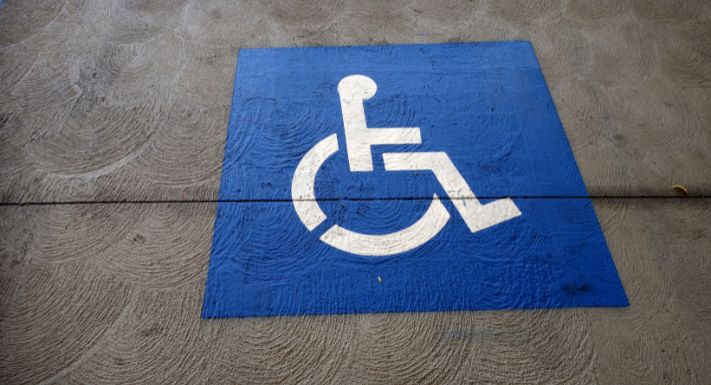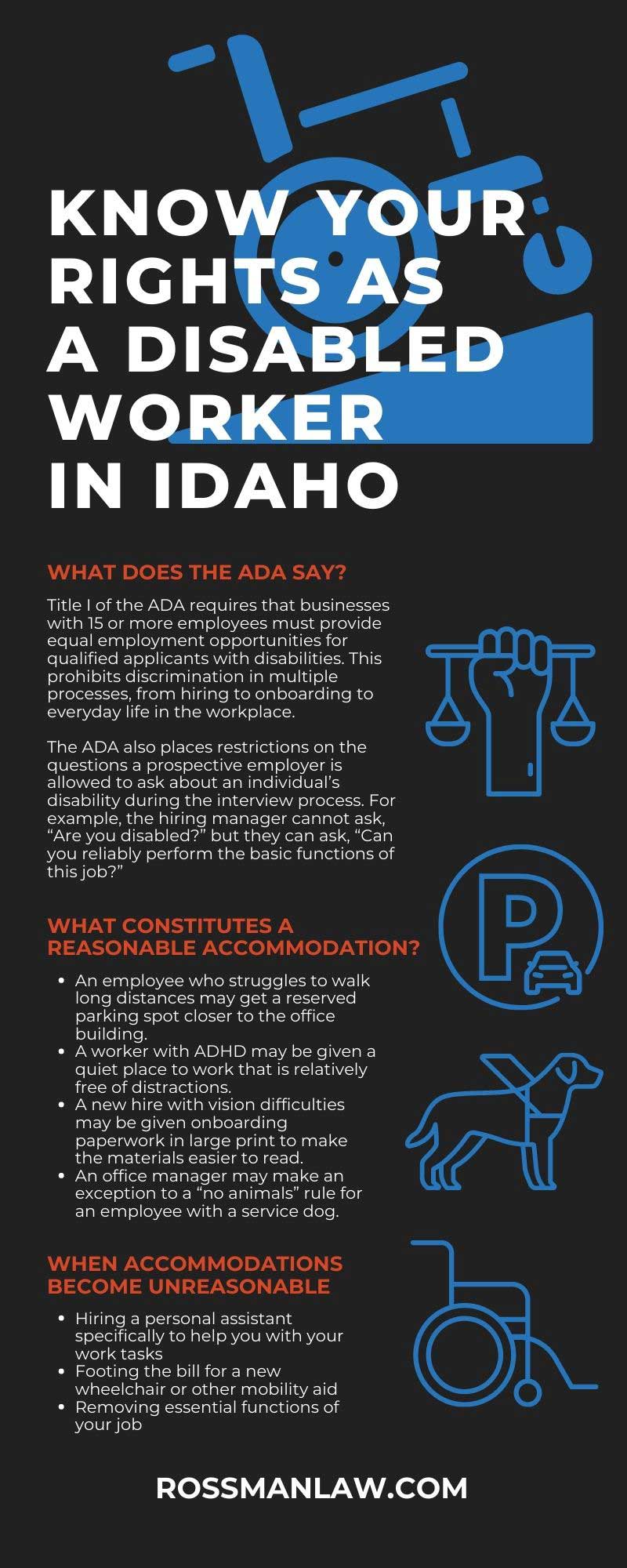
What You Should Do Upon Getting a Summons
October 27, 2022
Suing for Negligent Infliction of Emotional Distress
November 7, 2022There are thousands of workers in Idaho who live with disabilities. Are you one of them?
While the Americans with Disabilities Act (ADA) protects employees with disabilities, workplace discrimination is still an unfortunately common occurrence. In order to protect yourself as a disabled worker in Idaho, you need to know your rights. When you have that knowledge on your side, you can more effectively spot when discrimination occurs and advocate for yourself.
You deserve to work in an environment free of harassment and discrimination based on your disability. Rossman Law Group aims to uplift workers with disabilities and equip them with a working knowledge of the laws in Idaho. Read on for a quick course on disability rights in the workplace, and learn what you can do if you believe you are being discriminated against.
What Does the ADA Say?
The Americans with Disabilities Act covers a variety of provisions for people with disabilities and how they navigate the world. Buildings that are open to the public must provide accommodations like ramps and elevators for folks who use wheelchairs, for example. If you notice signs or elevator buttons indoors that feature Braille, you’ve got the ADA to thank.
Title I of the ADA requires that businesses with 15 or more employees must provide equal employment opportunities for qualified applicants with disabilities. This prohibits discrimination in multiple processes, from hiring to onboarding to everyday life in the workplace.
The ADA also places restrictions on the questions a prospective employer is allowed to ask about an individual’s disability during the interview process. For example, the hiring manager cannot ask, “Are you disabled?” but they can ask, “Can you reliably perform the basic functions of this job?”
Once you get the job, you are entitled to reasonable accommodations that allow you to perform the full scope of your work. The exception to this rule applies in instances where providing a certain accommodation places undue hardship on your employer.
What Constitutes a Reasonable Accommodation?
But what does “reasonable” mean in the context of providing accommodations at your job?
A reasonable accommodation is a change to the hiring process, the way the job is performed, or the work environment that makes it easier for a qualified worker with a disability to do the job. In practice, this may look like:
- An employee who struggles to walk long distances may get a reserved parking spot closer to the office building.
- A worker with ADHD may be given a quiet place to work that is relatively free of distractions.
- A new hire with vision difficulties may be given onboarding paperwork in large print to make the materials easier to read.
- An office manager may make an exception to a “no animals” rule for an employee with a service dog.
As long as these accommodations do not put undue hardship on the employer or pose a direct threat to anybody else in the workplace, they are considered reasonable.
When Accommodations Become Unreasonable
Some accommodations may be of great help to you but are too expensive or labor-intensive for your employer to reasonably provide. The following accommodations are not covered under the ADA, and your employer is not bound by law to offer them.
- Hiring a personal assistant specifically to help you with your work tasks
- Footing the bill for a new wheelchair or other mobility aid
- Removing essential functions of your job
At the end of the day, if your disability outright prevents you from performing the basic functions of a particular job, it’s best to apply for a different position.
Anti-Discrimination Laws
The laws of the state of Idaho prohibit employers from participating in discrimination based on an individual’s disability. What does discrimination look like in the workplace?
Perhaps you were passed up for a promotion because your employer felt that your learning disability would prevent you from taking on new roles and responsibilities. Or maybe you were the only one left out of an office team-builder because you walk with a cane and everybody else voted to play soccer. Disability discrimination, in short, means that your workplace is treating you less favorably specifically because of your disability.
If you believe that you have been subject to disability discrimination at work, talk to a disability attorney in Boise, Idaho, and tell them your story. If you plan to sue your workplace for discrimination, you will have to prove that the offense was directly based on your disability.
Anti-Harassment Laws
Workplace discrimination laws also factor in harassment or bullying at work. Workplace settings are made up of a variety of people with different sensibilities, and some are easier to get along with than others. Occasionally, workers with disabilities find themselves being bullied at work by people who defend themselves by saying it’s “just their sense of humor.”
However, if you tell a workplace bully to knock it off and they persist in harassing you because of your disability, you can take your complaint up the ladder. Human resources departments are trained to protect companies against harassment lawsuits, so they have a vested interest in solving complaints in-house.
What You Can Do
If you are being treated unfairly at work because of your disability, the law is on your side. Keep a record of all harassment or bullying incidents at work; if the person in question won’t stop and your boss is of no help, go to HR.
If your company’s human resources department is of no help, the next step is to speak with the Equal Employment Opportunity Commission (EEOC). Because Idaho does not have its own EEOC office, the Seattle field office takes complaints from Idaho. You can also contact the Idaho Human Rights Commission with your case; make sure to include all the evidence you’ve gathered.
Both the EEOC and the Idaho Human Rights Commission rarely prosecute discrimination and harassment cases on their own. However, if they agree with the validity of your case, they may give you a “right-to-sue” letter that gives you the go-ahead to hire a discrimination lawyer.
As a disabled worker in Idaho, you need to know your rights in order to fight for them! You are a valuable person with an inalienable right to dignity and fair treatment in accordance with federal and state laws. Rossman Law Group’s team of experienced and empathetic disability lawyers will listen to your story and provide valuable advice regarding the next steps in your discrimination case.






